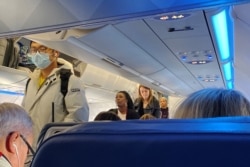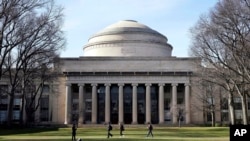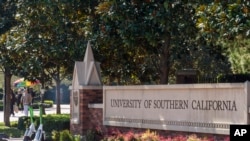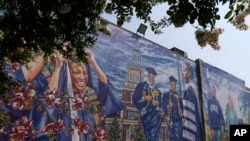Student Union
Surgical Masks Help Block Germs But Are No Guarantee
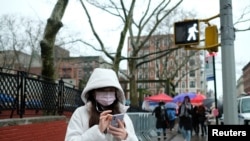
Imagine you're riding public transport to school or work and the man across the aisle erupts in a sneeze that explodes into the air. Halfway down the car, someone else coughs uncontrollably. Neither cover their mouth or nose.
The woman next to you is wearing a surgical mask, but you are not.
Are you doomed to get sick?
Experts say yes. And no.
Viruses -- like the coronavirus outbreak that started in Wuhan, China, recently and has migrated around the globe -- typically ride on aerosolized droplets, meaning the stuff that comes out of your nose and mouth when you cough and sneeze, explained Dr. Donald Milton, who directs the Maryland Institute for Applied Environmental Health.
Milton studies airborne viruses and heads the University of Maryland response team to students returning to school from China and other international travel. While surgical masks are advised -- particularly the N95 particulate respirator mask -- they do not offer complete coverage.
The U.S. government warns that masks do not "filter or block very small particles in the air that may be transmitted by coughs, sneezes or certain medical procedures."
And masks can’t prevent droplets from getting into your eyes, Milton said.
"I like to describe [it] as getting hit with a ballistic droplet in the eye,” he said.
Social media has been sharing hashtag #coveryourmouth, admonishing people to use the crook of their arm, a handkerchief or a tissue to block the spew of aerosolized germs in public places.
And then there are the railings, seats, doors and myriad handles that people routinely touch moving in and out of subways, classrooms, shops and at home after also touching their faces, noses and mouths.
"Door knobs are a favorite suspect,” Milton said. So handwashing (include the wrists and lower arms, health officials say) and disinfecting are key.
Millennial Doktora (@MillennialMD) tweeted a public service announcement Jan. 21, around the time the coronavirus outbreak began to make news.
"1. Wash your hands frequently. Use rubbing alcohol if this is not possible. 2. Cover your mouth when sneezing or coughing and then wash your hands. 3. Use face mask if you have cough. 4. Stay away from the young, elderly, pregnant, & cancer patients if you have [upper respiratory tract infection] symptoms,” she tweeted. “5. Don’t kiss babies!!! Not even their hands and feet. And wash your hands before and after touching a baby. 6. Teach young kids coughing and sneezing etiquette and handwashing technique especially when they go to school. 7. Drink your water, eat your fruits and veggies."
While surgical masks are not so unusual in Asian countries, they are conspicuous in Western ones where people might be reticent to use them, reported Japan Today in a story about surgical masks in 2017. “
In the UK, nobody would wear a mask like this unless they were very, very sick, or there was otherwise something terribly wrong afoot,” Japan Today reported. The article also cited an incident where locals in a seaside English town thought Japanese tourists wearing masks might be terrorists.
Frequent traveler Francesca Domenella said, at her father's urging, she started wearing a surgical mask after returning from China Jan. 12. The Italian aerospace engineer, working as a risk engineer for a global commercial insurance company, found a mask in a stylish black that is washable.
In Europe, surgical masks are not common so I was expecting people to give me weird looks, which they do as soon as they realize I am not Asian,” Domenella, who was traveling through Germany on her way to London, told VOA in an email. “People sneeze, cough all the time and it’s better to have it. I am wearing it now too. … Makes me feel like wearing an accessory rather than a device.”
The populations most at risk of contracting the virus are the elderly, the very young and those with compromised immune systems.
Milton said the college-age population of healthy young adults is less likely to get sick.
Early screening and identification, isolation and treatment are key to controlling the spread of the virus, he said. Among the more than 1 million international students in the U.S., more than 300,000 are Chinese. The U.S. universities with the largest Chinese-student populations are in New York, California, Massachusetts, Illinois and Indiana.
"We can handle this. It depends on early detection,” he said from the University of Maryland, which enrolls about 2,000 Chinese students.
See all News Updates of the Day
US remains top choice for Indian students going abroad
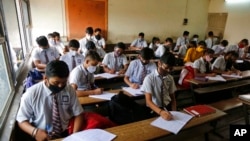
About 69% of Indian students traveling abroad for their studies chose the United States, according to a Oxford International’s Student Global Mobility Index. Other popular choices were the United Kingdom, Canada and Australia.
Education Times reports the main influencers for deciding where to study abroad – for Indian students and others – were parents. (April 2024)
Malaysian official: Schools can’t turn away from global tensions

Zambry Abdul Kadir, Malaysia’s higher education minister, said protests spreading across universities in the United States show that schools can’t ignore political tensions.
Helen Packer, reporting in Times Higher Education, said the minister reminded educators that universities are key in the development of leaders, individuals and societies. (April 2024)
Social media breaks are difficult, but necessary

Between online classes, maintaining social connections and working on projects, college students can have a hard time disengaging from the demands of technology.
In Florida International University’s PantherNOW, Ariana Rodriguez offers strategies for taking a break from social media. (April 2024)
- By Melos Ambaye
Many master's degrees aren't worth the investment, research shows
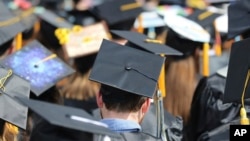
Nearly half of master's degrees have a negative financial return, according to new research by the Foundation for Research on Equal Opportunity, an economic research organization.
The study indicates that many graduate degree programs do not increase lifetime earnings enough to be worth it.
While 23% of bachelor’s degree programs yield a negative financial return on investment, 43% of two-year degrees and master’s degrees fail to deliver a return, according to the study by Preston Cooper, a senior fellow at FREOPP.
Cooper assessed the return on investment for 53,000 degree and certificate programs to determine whether a student’s lifetime earnings outweigh program costs and the risk of not completing their degree.
His findings show that a student’s field of study was the overriding indicator of return on investment at the undergraduate and graduate level.
Engineering, computer science and nursing bachelor’s degrees have high financial returns on investment, while programs in education, fine arts, psychology and English usually have low returns.
Graduate degrees in medicine and law tend to have strong payoffs. But a large share of master’s programs, including the MBA, frequently have low payoffs, according to Cooper.
Although workers with master’s degrees earn 16% more than those with only bachelor’s degrees, Cooper says the figure fails to account for students who had “higher preexisting earnings potential.”
“MBA students typically have high preexisting earnings potential, having often chosen high-ROI undergraduate majors such as finance and economics,” Cooper writes. “So the MBA adds little value on top of that.”
The study indicates that high starting salaries are predictors of high returns on investment. Degrees with starting salaries of $57,000 a year or more deliver the best lifetime returns.
But the return on investment of a degree can vary depending on the educational institution.
“Students interested in fields with low average pay can still find some schools that do well transforming those fields of study into high-paying careers,” Cooper writes.
The quality of an institution also matters, said William Tierney, professor emeritus of higher education at the University of Southern California.
“An MBA from Harvard is a likely ticket to a good job,” Tierney told VOA. “An MBA from the University of Phoenix, less so.”
But students pursue graduate programs for more than just financial reasons.
“Some degrees open up careers in fields that students may enjoy, such as in the performing arts,” Robert Kelchen, head of educational leadership at the University of Tennessee, Knoxville, told VOA.
“Others can help gain access to social networks or simply help students learn about a topic that is of interest,” Kelchen added.
Cooper told VOA that it might make sense for students in degree programs with low returns on investment to switch majors if they can still graduate on time.
He found the worst outcome for a student’s return on investment is dropping out of college “because they must pay for one or more years’ tuition and spend time out of the labor force.”
Lawmakers who fund higher education have a responsibility in ensuring “higher education delivers on its promise of economic mobility,” Cooper said.
Nearly a third of federal funding, including Pell grants and student loans, pays for higher education programs that fail to provide students with a return on investment, according to the study.
Cooper’s view is that “some schools should shut down low-ROI programs and reallocate institutional resources to programs with a better return.”
“There's definitely this narrative out there that higher education is always worth it, and you should always try to get that extra degree because it will increase your earnings,” he told VOA. “That's reinforced by colleges who make lofty promises regarding their graduate degree programs' outcomes, which all too often fall short.”
Harvard students end protest as school agrees to discuss Gaza conflict
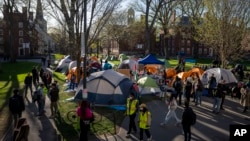
Protesters against the war between Israel and Hamas were voluntarily taking down their tents in Harvard Yard on Tuesday after university officials agreed to discuss their questions about the endowment, bringing a peaceful end to the kinds of demonstrations that were broken up by police on other campuses.
The student protest group Harvard Out of Occupied Palestine said in a statement that the encampment "outlasted its utility with respect to our demands." Meanwhile, Harvard University interim President Alan Garber agreed to pursue a meeting between protesters and university officials regarding the students' questions.
Students at many college campuses this spring set up similar encampments, calling for their schools to cut ties with Israel and businesses that support it.
The Israel-Hamas war began when Hamas and other militants stormed into southern Israel on October 7, killing some 1,200 people and taking 250 hostages. Palestinian militants still hold about 100 captives, and Israel's military has killed more than 35,000 people in Gaza, according to Gaza's Health Ministry, which doesn't distinguish between civilians and combatants.
Harvard said its president and the dean of the Faculty of Arts and Sciences, Hopi Hoekstra, will meet with the protesters to discuss the conflict in the Middle East.
The protesters said they worked out an agreement to meet with university officials, including the Harvard Management Company, which oversees the world's largest academic endowment, valued at about $50 billion.
The protesters' statement said the students will set an agenda that includes discussions on disclosure, divestment, reinvestment and the creation of a Center for Palestine Studies. The students also said that Harvard has offered to retract suspensions of more than 20 students and student workers and back down on disciplinary measures faced by 60 more.
"Since its establishment three weeks ago, the encampment has both broadened and deepened Palestine solidarity organizing on campus," a spokesperson for the protesters said. "It has moved the needle on disclosure and divestment at Harvard."




